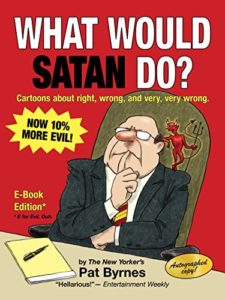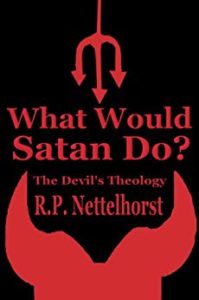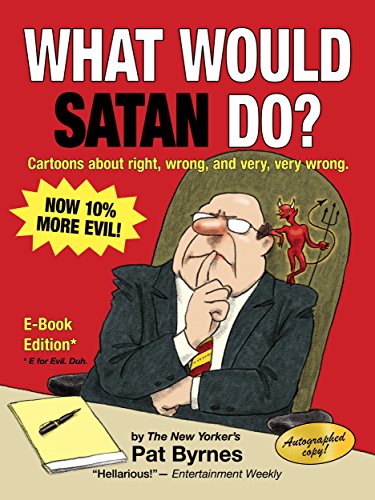The Danger of Anti-Pearl-Clutching: What Would Satan Do?
The series on “What’s the Deal with the Devil” is nearing it’s end. The next-to-last topic will take last week’s post about the spiritual war through culture during the time of the Bible and fast forward to talking about the spiritual warfare through culture, including popular culture, that we fight today. But before we get there, there’s a topic that has to be addressed first. Perhaps two topics, but I’m making them one. First, what’s the downside to skepticism about the topic of spiritual war–which I’m calling “anti-pearl-clutching”–and second, what benefit can we gain from thinking about What Would Satan Do (WWSD)?
Anti-Pearl-Clutching
You know that aunt or great-aunt who reacts in horror, drawing in a deep breath, eyes wide in shock, at the mere mention of Harry Potter? Or the mention of many other things? She may or may not have any literal string of pearls to grasp as her far-too-easily-triggered shock reaction is set off, but you get the idea. She may not be your auntie (who is perhaps very cool), but she’s somebody’s aunt or mother or grandmother and if you don’t personally know an example you at least know of the idea of someone who over-reacts to certain kinds of things. She and women like her–and yes, men like her too (indeed there are male “pearl-clutchers,” albeit almost always sans pearls) set the eyes of a certain group of people a-rolling. Sure, Auntie, whatever. Or perhaps: OK, boomer.
Who is the certain group of people I just mentioned? Let’s call them “anti-pearl-clutchers” and what they do when rolling their eyes in skepticism, “anti-pearl-clutching.”
Anti-pearl-clutchers perhaps have read Harry Potter or have played Dungeons and Dragons or maybe even messed with an Ouija board briefly and they are pretty sure Satan did not rip off the top of their skull when they did so and come to permanently reside inside their brain. They’re also pretty sure that claims about Satan/the Devil are grossly exaggerated in some circles, like, to the point of being ridiculous. To the point of making human choices seem unimportant, because so much evil is attributed to Satan. In contrast, we know for certain a lot of evil comes from things people decide to do, things people would perhaps do at least at times if Satan wasn’t even around.
By the way, the line I dropped into the paragraph about about messing with an Ouija board and nothing bad happening is not meant to be an endorsement of Ouija boards. That’s not where I’m going at all, since playing with the Occult is something the Bible very clearly forbids–but it is possible to goof around with a Ouija board and/or Tarot cards and similar things without anything noticeable happening. (Not that “anything noticeable” is always the same as “anything.”)
Since speculative fiction deals with topics that pearl-clutching avoids, like magic or aliens, it’s probable that the vast majority of readers of Speculative Faith are aligned with the anti-pearl-clutching crowd. At least a little bit. It could be in fact be the case right now that someone is reading this article and thinking concerning my comments here: OK, boomer (I’m actually an older Gen X member, not that when I was born is actually important to this topic). Or something similarly dismissive. There’s a reason for that.
You’ll shoot your eye out!

Image credit: Tenor.com
The movie A Christmas Story famously evokes Ralphie wanting to have a BB gun but being warned by all kinds of people that he shouldn’t have one because if he does, the risk is “you’ll shoot your eye out.” This idea is over-exaggerated to the point of being silly, this hypothetical risk that everyone clings to as if it were a fact showing a classic example of pearl-clutching in a story.
We in fact may know people who used BB guns or pellet guns or airsoft guns for years, perhaps even people who used them recklessly, who suffered nothing more than skin welts. Nothing serious happened to them. So clearly BB guns are safe, right?
Er, no. According to an article Google pulled up for me when I searched “BB gun injuries,” over 23,000 kids went to an emergency room in the nineties because of injuries sustained from a BB or pellet gun in the USA. In 1990 alone in the United States, 12 kids died from injuries sustained by BB guns. Died. (For the medically curious, my brief research on the topic found point-blank shots at the eye with a BB gun may go around the eye, through the eye socket, and into the brain–where is a potentially fatal wound if the BB or pellet hits a major blood vessel inside soft brain tissue.)
Realistic Safety
So in the case of BB guns I just touched on, while it may in fact be laughable to avoid them at all costs because of their dangers, there is actually middle ground between pearl-clutching forbidding any use of air rifles and freewheeling you-can-do-whatever-you-like-son. You can allow them to be used, but recommend caution. Maybe, quite seriously, some eye protection is in order. At least at times. Certainly kids need to be informed that a point blank shot at yourself, especially at your face, represents real danger and should be avoided. (True story, one of my children shot himself point-blank with an airsoft rifle in the face, punching right through his skin with a plastic pellet. He should have known better, but it happened anyway.)
To be clear, what I’m talking about with this What’s the Deal with the Devil series is not me endorsing pearl-clutching. It’s a call for realistic safety and realistic awareness of actual danger.
The Danger of Anti-Pearl-Clutching
We can perhaps compare anti-pearl-clutching to an adolescent phase in a person’s thinking. As a child, you know there are dangers and perhaps might be paralyzed by them. As an adolescent, you might laugh off danger and do some really risky stuff. This is especially common for testosterone-laden young men driving cars (among other things), but some young women are major risk-takers, too. Though of course not all adolescents are risk-takers, but for those who are, after they’ve been in some fender-benders or worse because of a lack of caution, as adults, they come to understand there’s such a thing as healthy fear. Not fear that paralyzes you so you can’t do anything, but a touch of fear that makes you more alert than you would otherwise be. A fear that causes you to put on your seat belt and slow down when road conditions are bad.
Since so many people have over-exaggerated the dangers of certain cultural influences and have over-exaggerated Satan’s power, the natural reaction to that is to go the opposite direction and think the Devil is a chump whom we can safely ignore. That we don’t need to think about Satan at all, that putting any emphasis on the Devil at all is a sheer waste of time, since we know that the cross of Christ has defeated Satan.
Yes, Satan is defeated, but from what the Bible actually says, as quoted throughout this series, he’s still active and still dangerous. My post on how to face the devil in combat (part 1) mentioned that the main thing we need to do to defeat Satan is live for God fully and truly.
Yes, that’s also true, in addition to Satan’s fate being already determined–but how we pray for other people (and ourselves) is affected by the realization that spiritual warfare is real, that Satan is real, that he is actively leading into sin and deceiving whomever he can. Satan is actively ruining the lives of some people and is a significant influence in our culture–we need to be aware of that and alert to the possibility of our own vulnerability. For own safety and the safety of others. Not in panic, but with alertness, trusting God to deliver us when we need him.
So What Would Satan Do (WWSD)?
I’m of course playing off the dead-now craze of WWJD, “What Would Jesus Do,” that for a time adorned bracelets and was on the mind of many Christians. (I’m not saying WWJD is totally dead, but I can’t recall the last time I saw a WWJD bracelet.)

Here’s a humorous take on WWSD. Image copyright by Pat Byrnes.
By the way, I never personally bought into WWJD because I keep seeing Jesus’s disciples being surprised at things Jesus did–such as meeting with the Samaritan woman, or driving money changers out of the temple, or even when he mentioned “the leaven of the Pharisees” (Matthew 16:6-9), they thought he was talking about provisions for a trip. He surprised them and can surprise us too–though if thinking WWJD is helpful to you, don’t let me stop you from doing so. I’d say though that one of the reasons the Holy Spirit was given to Christians was to guide us into what Jesus wants us to do–as opposed to us using our imagination to guess WWJD.

This is the apparently serious theological book on WWSD on Amazon. Image copyright: R.P. Nettlehorst.
Note that while writing this article for Speculative Faith I found four titles on Amazon for What Would Satan Do? One is a satirical novel that seems to glorify Satan, one is a set of comics full of dark humor that I made into the featured image for this post, one seems to be a serious book of theology about the Devil, and one is an odd bit of wacky theology and a story combined. So I’m not even close to being the first person to say “WWSD.”
But my reasons relate to military thinking. US Army doctrine includes sketching the terrain around you to identify what is there in a fixed position in a combat zone (part of a “range card”)–so if something changes, you’ll be aware of it. Military doctrine also encourages a person to consider probable “avenues of approach.” As in, “if an enemy is going to attack me here, what’s the most likely way they would get here?” Army operations orders include a section on enemy activity that lists both the most probable action the enemy will take and also the most dangerous action the enemy could take.
I don’t want to lead a descent into paranoia by suggesting Christians continually worry about what Satan would or could do–I’m saying this intended to shore up the “Realistic Safety” point I made above. A person who is going to be realistically safe is going to consider what could go wrong at appropriate moments and then take steps to avoid the worst, if at all possible. And if you have an active enemy trying to hurt you, it might be worthwhile to consider what the enemy would do under the circumstances, what the enemy would think–or in the case of spiritual warfare, WWSD.
Lest you think the idea of considering What Would Satan Do is unbiblical, note that in the context of discussing unforgiveness among Christians, the Apostle Paul (as inspired by the Holy Spirit) mentions an awareness of the schemes of the Devil (2 Corinthians 2:11). The context clearly suggests that being aware of the kinds of things Satan does helps a person avoid falling for Satan’s schemes.
So perhaps we ought to consider what is Satan could do in any given situation we face. Certainly the “Billy Graham rule” practiced by some Christian leaders in which male leaders refuse to meet with a woman alone would seem to account for WWSD. Because Satan is not only capable of provoking sexual temptation to sin when a man and a woman are together without anyone else around, he’s capable of putting it into someone’s mind to accuse the Christian leader of impropriety, even if he’s done nothing.
The Billy Graham rule or variations thereof should also be considered when dealing with other people’s children. Just sayin’.
Great advice, but do you “practice what you preach?”
In truth, I’m actually mediocre at WWSD thinking. At major points in my life I have failed to anticipate how I could come under attack by Satan. Or how other people would be attacked by the Devil, people I should have been praying for. I have as a result made some major mistakes and have been a sucker for common sins at times. And have failed to help other people the way I should have. (But I don’t always fail, thank God. 🙂 )
I talk about caution and thinking about what the enemy could do not because I’m a natural for pearl-clutching, but rather because I’m a natural risk-taker and have seen how my natural lack of caution has hurt me at times. In some aspects of my life, even though I talk about anti-pearl-clutching as a danger, I’m a de facto anti-pearl-clutcher. So what I’m writing is for me–even though I have learned to apply more caution to my spiritual life than I used to, I’ve still got to do better at applying what I know to be true. Some other people might not need to think along these lines any more than they already do–but what I mention here is important for me and people like me.
What about you? Do you ever think about the worst Satan could do in various situations (WWSD)? Do see a value in such thinking? What have I not mentioned that perhaps I should have? Other thoughts?










































(I had an existential moment because here I am fired up to make a wild-child rebuttal yet I am not a poster child for wildness at all. Y’all I knit as a hobby. I’m a chronologically challenged eccentric auntie with tufts of cat hair falling off my hoodie. I’m the same age as Brennen, just with more life force intact because I don’t have a small child siphoning it off.)
But if you feel like most of Christian discourse is just moving the goalposts around, I feel you hard. Don’t do this, don’t do that, like we’re toddlers in a store being told not to touch anything. My credit score is in the high 700’s, I don’t need a lecture about prudence.
It’s probably just the generation gap, that I want discussions about authentic experiences rather than a lecture from a self-appointed professor who can be summed up with a bumper sticker about moderation in everything, including moderation.
So I like this part where Travis admits to being a military-flavored nerrrrrrd who thinks in textbook tactics because of his training.
It’s not really the content of this series, just the structure and packaging, that he feels obligated to this fossilized format like a common John Piper. At probably twice the word count I would find necessary, thanks to his training in redundancy. (Nerrrrrd)
And this is where Notleia manages to be both belittling AND empathetic. Lol.
It’s interesting though that I referenced a generation gap in this article as in suspecting people thinking it would be an influence on me, whereas my personal experience would suggest I’m only in certain relatively limited ways a product of my generation (I did after all ride a horse to school in elementary school and read 1950s science fiction growing up–hardly typical Gen X stuff).
As for being a self-appointed professor, this is the generation for it, isn’t it? I think I need to move to YouTube, where hordes of self-appointed professors make money off videos of themselves talking about stuff. Cause I’m not making any money here–just sharing because I care… 🙂
Yeah, maybe my total word count is twice what it needs to be or more…but what I’m saying doesn’t boil down to something that would fit on a bumper sticker. I certainly would not agree anyway that, “Moderation in all things, even in moderation” sums up the message of this series.
Not to brag or anything, but I’m way nicer than a YouTube comments section :p
Very true :p
K, I did laugh at the child comment, but to be fair, my daughter gives me much more than she takes. It’s a wonderful experience, and I had zero desire for children before having her. I actually worried I wouldn’t like my own child. But she’s my treasure, and I’m infinitely proud of her. Anyways, I feel the same about Travis’ long, wordy style–it’s not for me–but I do at the same time appreciate it, and think it’s perfectly legitimate. It’s part of who he is, and I like it. (That may sound contradictory, but I mean it.) And he makes good points. What’s wrong with affirming the truth? I still need to be reminded of what I learned in pre-school almost daily. It’s annoying, but true.
You know, my first reply to your comment missed something very important. In terms of applying caution to life in general, yes, I find it very believable that you are a non-risk taker. But when we talk about the subject at hand, spiritual influence and the power of the Devil to affect a human being’s thinking, aren’t you completely, as in 100%, incautious? As in “I can do and think whatever I want, because Satan isn’t even real?”
Right?
So let’s speak truth to power here (as some people like to say). My long, wordy messages are in part for the purpose of convincing people who are blind to actual danger, such as yourself, that danger exists. I mention the personality type thing because I don’t want to spin anyone the opposite way, into fear and paranoia. But in your particular case, I’d be doing well to get you to think there’s any danger at all.
Because when it comes to spiritual danger, everything you say indicates you’re like a skydiver who thinks backup parachutes are for pansies…
But if someone doesn’t believe in the devil, how does an article about being on guard against the devil convince them? That’s like saying ‘Be very careful, there’s poisonous snakes in these woods’. If the other people in the group don’t believe there’s poisonous snakes in that forest, they’re just going to roll their eyes and keep going.
I’m not saying that the article needed to be about why the devil exists or that you immediately needed to swoop in with a debate on the devil’s existence, but if notleia truly doesn’t believe in satan, then jumping ahead to tell her to be cautious about satan is missing some rather crucial steps, as far as trying to bring her to your side would go.
Given this website it’s not a bad assumption for him to make, that most people here hold a literalist view of Satan. I’m just the resident contrarian who says so out loud. And also take my frustrations of the establishment out on him, because he’s very convenient for that.
I think your contrarian thoughts represent the thoughts of a significant proportion of readers of Speculative Faith. If not to the degree you hold them, at least in part.
But that’s why you comment here–you’re not simply taking out frustrations, you’re making a case for a certain worldview and by consistently presenting it, you are calling on others to believe what you believe. Whether you realize that or not.
I am of course trying to win you back to God, which sounds hokey to you I’m sure. But I’m a fan of what the bishop said to Jean Valjean in Les Miserables… 🙂
A very important reason to point out in a comment that Notleia doesn’t believe in Satan is to make it clear to any casual readers unfamiliar with her, who do happen to believe in Satan, that Notleia’s statement about not being a risk taker cannot be taken at face value on this topic. Because understanding context is a good thing.
And while I have not laid out a case that Satan exists per se, I have laid out a case that explains (as best as I was able to do) what the Bible actually says about Satan, as opposed to what “pearl-clutchers” imagine is true. That kind of systematic explanation that makes sense is convincing to some people. True, I never really expected Notleia to be convinced, but one never knows what is going to happen.
“Speak truth to power”? Dude, what power do you imagine I have in this context? My social net worth here is sustained with my being witty and willing to make fun of myself.
But it comes down to that I don’t think Satan works like that.
I see you having power here, influence. Perhaps you don’t, but I do.
How much tho? You’re the one with the recognized platform here, with your recurring slot in the writer roster. Just ’cause you weren’t able to get me banned that one time doesn’t mean Ive overpowered you.
Let me point out that I asked the question why it is you consistently offer what I think can be fairly considered non-Christian advice on a Christian site. I asked why it is we put up with that–perhaps we should do something about it. But I and I alone was the only one to publicly express my concern.
Which reveals, as numerous other things do, that in spite of the platform I have been generously offered here, I do not have all that much influence. None at all in fact–other than a certain measure of a power to persuade.
Still puts you on thoroughly iffy ground for using the phrase “speak truth to power” if we have comparable levels of influence.
But I think that’s one thing that gets under your skin, that you think you OUGHT to have a higher level of influence because you’re older or more orthodox or what have you. But when you called for banning me, it just looked petty. Also I’m not sure this site has the infrastructure to ban people.
I don’t think in terms of WWSD, but I do think in terms of possibilities and contingencies. But then I do that with everything, constantly analyzing what can happen and how to deal with it.
One of the most important things is self awareness, too. Something that drives me crazy is when people hear about a particular topic, look at it as bad, and are like ‘Oh no, never in a million years could I do something like that.’ And then because of that attitude they not only pass unnecessary judgment on those that make the mistake in question, but they also increase their own chances of making that mistake.
One time I read an article on a marriage counseling ministry website, and they said one thing that greatly increases the chances of someone getting in an affair is assuming they’re such a good person that they could never betray their spouse. Thus, they let their guard down and don’t recognize the signs of a limerent affair creeping up on them until it’s too late.
In some ways that’s probably a matter of naivety. Someone could just assume that people only cheat after making a momentary decision, or after one instance of being flirted with. That can happen, but there’s also times when it creeps up on a person. Like if they’re feuding with their spouse and then they end up confiding in someone of the opposite gender. Repeatedly. If that person keeps supporting them and making them feel happy they may eventually they find themselves in love instead of ‘just friends’.
So it’s important to accept how deeply flawed each person is and realize that almost any type of behavior can happen if the right circumstances come up. Learning to realistically think through potential scenarios is vital for learning where one’s personal hangups are. ‘If I was in that person’s shoes, what would I have done?’ Is a good place to start. And don’t just do that for one side of the situation, either. Putting one’s self in the shoes of people on both sides of the situation increases awareness by a lot more. But this also requires honesty. Like, people shouldn’t do this based on how they THINK they should act. Instead, they need to constantly think about how they normally act and why, and how that would actually impact their behavior in a situation they haven’t been in yet.
If someone wants to do that in terms of WWSD, that’s fine. If someone has a personal hangups and Satan wanted to target them, obviously he would go for their weaknesses in many cases.
I think it’s fair to say Satan and his crew study and target individual weaknesses. So your comment is on track. Thanks for your input.
I support the formation of self-awareness.
+1
Heck, self awareness is probably a subject worth exploring in depth here. It’s a particular hamstring I find hamstrung in a lot of Christian writers. It ties back to that thing I brought up a few posts ago, when writers write scenes they think are perceived as positive for their characters when they really come off as a negative. Like 75% of the Slacktivist’s criticisms of Left Behind.
I think the source of that problem is that they don’t understand well how people ARE rather than how they think they should be, and that discrepancy is another blind spot because they also don’t even begin to understand how they ARE apart from how they see themselves.
It takes time and experience. A lot of people believe in self awareness or at least admit that it’s important, but actually getting there takes a lot.
Kinda comes down to a lot of more complicated stuff, though. One time I was in a roleplay, and one of my chars (I think he was supposed to be part of a modern assassin guild) was talking to another person’s character. My char was describing how he was raised, and mentioned that sometimes when he watched tv, his parents would ask him to analyze situations in the show and how the chars could have made things better. Or how the situation could have been applied to real life, that way he learned how to avoid mistakes in the future. The other char was a little surprised by this, and basically just said that her parents just let their kids live and play and stuff, and learn from experience. I didn’t get the impression that the char was saying her parents were permissive and let their kids do whatever they wanted without discipline. But it sounded like they had a much more ‘live in the moment’ and ‘take life as it comes’ attitude when it came to mistakes.
‘Live in the moment and take life as it comes’ is much more of a Concrete perspective. Focused on the here and now, rather than futures and what ifs. People like me are primarily Abstract, focused on the what ifs and future. Everyone has times when they can be Concrete and Abstract, but whichever trait they use naturally or at least the most often is which one they are considered.
Not nearly every Abstract person has enough self awareness, especially if life hasn’t hit them over the head often enough to make them pay attention. Still, Concrete people are more likely to scoff at the what ifs in a lot of scenarios(and thinking through what ifs is an extremely good/easy tool for developing self awareness). And technically the majority of the population is Concrete. Unfortunately, I see a lot of situations like in that roleplay, which means a lot of people simply don’t want to put in the work to become self aware, learn to navigate their future or optimize their social interactions. They might believe that self awareness is good, but they don’t truly understand how important it is until life comes crashing down on them often enough. Abstract people can have that problem too, but their inclination toward what if scenarios can make them worry enough about the future that they’re motivated to change.
Obviously a parent shouldn’t turn every show the kid watches into an obvious lesson. People should have times when they sit there and just enjoy things, too. And they often absorb lessons from things whether they mean to or not. Still, the sad reality is that people don’t do the work it takes to become better because they don’t even understand the need in the first place.
Every writer’s view of reality can be criticized by someone from another culture or POV. Doesn’t mean they automatically lack self awareness.
Take that Moody Institute dude who wrote the novel with damsel-rescuing and not much else. I think the generous interpretation is that he’s not aware of what that implies about himself.
Yes, but the point is none of us are aware of everything our writing implies about us.
He could have some self awareness without having ENOUGH self awareness for that, right? It’s not a yes/no sort of thing.
Something to point out about that is that a person can be self aware about something, but that doesn’t mean they know how to fix it. There’s certain stages that tons of fiction writers go through as they’re learning. One common one is to write flat characters that fit certain tropes or that don’t make sense. Or they write really horrible Mary Sue type chars. It doesn’t matter if they’re Christian or not, it’s just a natural human inclination.
But then as they go along and hone their craft, get feedback, etc. they become aware of the shallowness of their writing and Mary Sueness of their chars. Then they try to fix it…but no matter how self aware they might be about those issues, actually knowing how to fix it might be another matter entirely. After a while it gets to the point where a writer can both recognize those problems AND fix them most of the time, but there will still be slip ups because it’s hard to actually account for everything.
For me…IDK, I’ve actually been writing for a very long time even though I haven’t published anything yet, so I can kinda sense when there’s big problems with my chars or stories. But then fixing those is hard. Like, sheesh, even in the current chapter of a fanfiction I’m working on, I kinda feel like the char is whining too much and will come across way wrong to the audience. But then that leads to the never ending struggle between quality and productivity(it’s taking forever to fix that chapter). Since it’s just a fanfiction I can manage to make myself take the time to ensure a somewhat reasonable level of quality. But when it comes to an actual traditional publishing situation, that’s a lot harder. So there’s a lot of factors that go into that stuff. Sometimes it’s easy to assume that someone isn’t self aware when they actually are.
Maybe the guy who wrote that Chiveis Trilogy wasn’t self aware. But even if he was, would he have known know to fix everything? Maybe he could have made it better, but it still could have had tons of issues for us to complain about.
He could have definitely cut back on the white knight fantasy if he was aware he was doing it.
Let’s take a stroll in the weeds, shall we? What wild and irresponsible speculations about this guy can we pull from hearsay about the text?
So ~clearly~ the most meaningful connection he finds between a man and a woman is one using righteous violence to save the other from sexual violence of a different and also lesser man. Could they bond through conversation or a shared goal they both contributed to? I guess only if that shared goal was her preserved [redacted]. wHaT eLsE cAn a wOmAn cOnTrIbuTe To a rElAtIoNsHiP¿
Was this the only way he could justify her existence in the narrative? Or is a power fantasy just too boring without a recumbent chick to cling to the hero’s ankle in the poster?
If a hero falls in the forest without a recumbent chick to gaze adoringly at him, does he make a sound?
If a woman exists without a man present to objectify or pedestal her, is she still feminine?
Well, like I said, if he was aware of some things, he could have IMPROVED, but would he have been able to fix enough for us to say he did a good job? Or even just say the book was mediocre?
MAYBE that’s the most meaningful connection he finds between a man and a woman, but you also have to be aware that those are/were some extremely common fantasy tropes. Or at least ones put forth in classic fairy tales many people grew up with. Could the guy actually like/want/tolerate that kind of relationship with a woman, especially in real life? Quite possibly not(because that would get very annoying and could only be tolerated so long if it was as obvious and consistent as in the book). Part of this could also be that that’s what he thought fantasy stories were supposed to be composed of. I agree that self awareness may very well have been part of his deal, but you might be overstating it.
That said, a lot of why I was saying all that stuff earlier was to make the point that you seem to be putting a lot of writing problems down to a certain brand of self awareness when it’s really more complicated than that. Like, even when self awareness is part of it, there’s probably at least one other factor at play, too.
I don’t find it very reassuring if he’s drinking his own Koolaid.
Of course it’s more complicated than that, but I submit that a deficiency of self awareness is at least a load-bearing wall in this horribly mixed metaphor.
I am not a natural risk taker myself. My nature preserves me from sins such as gambling, drunkenness and other escapades. But excessive caution provides its own spiritual challenges.
What Would Satan Do? sounds a bit like The Screwtape Letters.
I quit reading fantasy as a child for a few years because I heard some ladies at church condemn it.
Now I say–if all fantasy is witchcraft then all romance is porn.
Hiding in the house all day because a truck MIGHT hit you if you go out is kind of what I had been trained to do intellectually as a kid.
Saaaaame. My dad is an anxious personality type who learned only the least flexible of coping mechanisms. I have that weakness, tho I take after my mom who only has a handful of fvcks to give at any given moment.
It’s an interesting inner conflict. So my car has a toolset, a just in case blanket for winter, and an extra reusable shopping bag, but none of it is organized and also buried under 15 lbs of trash like the packaging of my new windshield wipers.
I’m sorry to hear that paranoia on the part of pearl-clutchers caused you to abandon fantasy for a while. Clearly you no longer believe what those ladies at church had to say. But the question I have for you is have you gone too far in the opposite direction?
If you think that fantasy, because it is fiction, has no ability to influence human beings in a negative way–or that all fantasy is good–you’d be living in the land of anti-pearl-clutching in my opinion, even if you by nature are a cautious person.
The “negative way” I’m referencing would be perhaps directing a person’s thoughts in the direction of sin (as the Gore series influenced me) or even causing a very small percentage of fantasy readers to become curious about Neo-Paganism in a way leading to literal worship of false gods. As I believe happened with my older sister.
The “I have never been hurt by fantasy so there must be no harm” school of thought is very similar to the notion of “I used to shoot BBs at my brother all the time, and he shot back, and neither of us got seriously hurt, so they must be safe.” But some people DO get hurt, even if you haven’t. And sometimes, in the case of smoking especially, people can be carrying around something harmful to themselves without being fully aware of the harm.
I don’t actually think of you as someone who ignores caution even in what you read. You are probably well-aware of stuff you’d be better off not reading and other stuff you might read, but would not recommend to people not very grounded in their Christian walk (such as young teens).
Notleia on the other hand, when it comes to entertainment, does whatever she wants! From what I’m able to determine, anyhow. And scoffs at potential problems.
I have faith in her. Based on her other comments, she’s much more agreeable than I am.
(and this is the moment Travis is tempted to make a remark he would say with the intent of being funny but might come across as hostile, so he edits himself and doesn’t say it 🙂 )
Absolutely fantastic article!! Thank you so much for sharing!
Thank you!